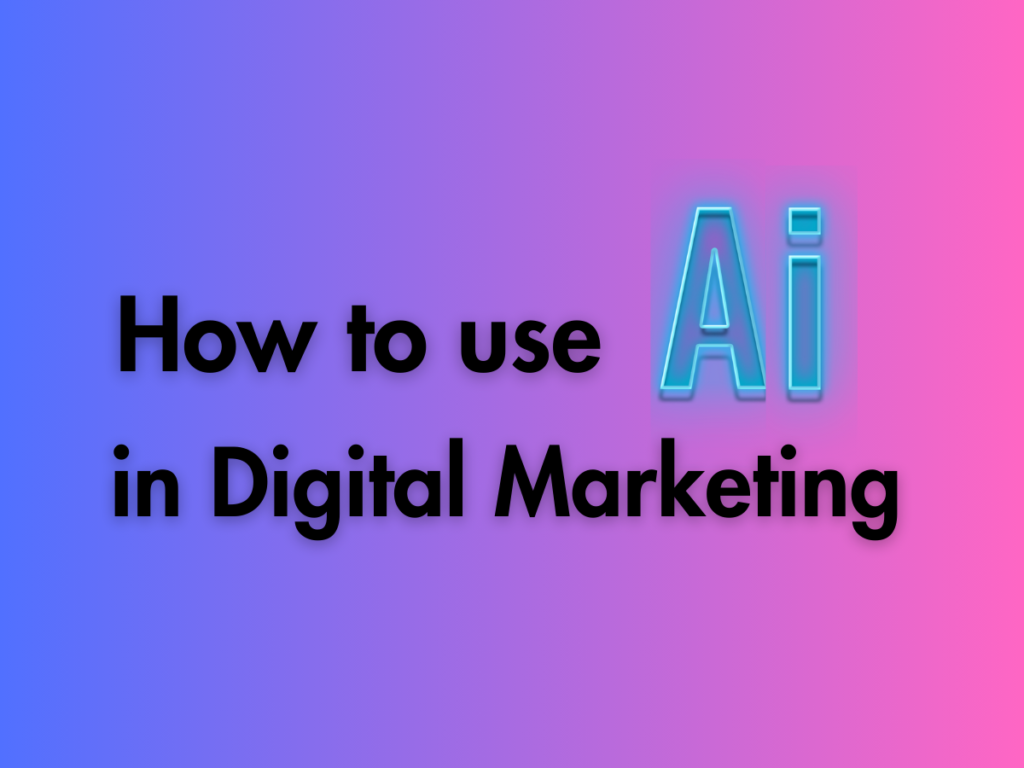Artificial Intelligence (AI) is revolutionizing the digital marketing landscape. From data analysis to personalized content delivery and customer engagement, AI has become an indispensable tool for marketers aiming to stay competitive in the online world. In this in-depth article, we will explore how you can leverage AI to enhance your digital marketing campaigns, achieve better results, and provide an exceptional user experience.
Table of Contents
ToggleUnderstanding AI in Digital Marketing
AI, in the context of digital marketing, involves the use of machine learning algorithms, natural language processing, and other advanced technologies to automate, optimize, and personalize marketing strategies. It empowers marketers to make data-driven decisions and adapt campaigns in real time.
Data Collection and Analysis
Utilizing AI for Data Collection:
AI can collect and process vast amounts of data from various sources, including user interactions, website behavior, and social media activity.
Advanced Data Analysis:
AI-driven analytics tools can uncover valuable insights and patterns in your data, helping you understand customer preferences, trends, and market fluctuations.
Personalization through AI:
AI enables the creation of highly personalized marketing messages and product recommendations, enhancing user engagement and conversions.
Content Creation and Optimization
AI-Generated Content:
While AI can generate content, it’s important to strike a balance between human-generated and AI-generated content. AI can be a powerful aid for creating product descriptions, blog posts, and social media updates.
SEO Optimization:
AI-powered tools can analyze keyword trends, suggest improvements to content, and even automate the optimization of meta tags and descriptions for better search engine rankings.
A/B Testing and AI:
AI-driven A/B testing tools can help you experiment with different content variations and identify which ones resonate best with your audience.
Customer Engagement and Chatbots
AI-Powered Chatbots:
Chatbots can provide instant customer support and interact with users 24/7. They can answer frequently asked questions, guide users through the sales funnel, and offer a personalized experience.
Enhancing User Experience:
AI can analyze user behavior to suggest products, content, or services, thus increasing user satisfaction and time spent on your website.
Benefits of AI-Driven Customer Engagement Strategies:
Improved customer engagement leads to increased customer loyalty, higher conversion rates, and a positive brand image.
Targeted Advertising
Personalized Ad Targeting:
AI can segment your audience into highly specific categories based on their behavior and preferences. This enables personalized ad targeting, resulting in better click-through rates and conversion rates.
Retargeting and Dynamic Ads:
AI-driven retargeting campaigns ensure that users see products or services they’ve shown interest in, even when they leave your website. Dynamic ads adapt to user preferences in real-time.
Measuring Ad Performance with AI:
AI can help you evaluate the performance of your advertising campaigns, enabling quick adjustments to maximize ROI.
Predictive Analytics
How AI Predicts Customer Behavior:
AI models use historical data to forecast future customer behavior, allowing you to proactively tailor your marketing strategies.
Forecasting and Trend Analysis:
Predictive analytics can identify emerging trends and market opportunities, giving you a competitive edge.
Predictive Analytics Tools for Digital Marketing:
Various tools and platforms offer predictive analytics capabilities that are accessible to marketers.
Case Studies
To better understand the impact of AI on digital marketing campaigns, let’s explore some real-world examples.
Case Study 1: Netflix
Netflix’s recommendation system is a prime example of AI-driven personalization. By analyzing user viewing history, AI algorithms suggest relevant content, keeping users engaged and subscribed.
Case Study 2: Amazon
Amazon employs AI for personalized product recommendations and dynamic pricing adjustments. This results in higher sales and customer satisfaction.
Case Study 3: Sephora
Sephora’s chatbot, Sephora Virtual Artist, assists customers in finding the right products, enhancing user experience and increasing sales.
Challenges and Ethical Considerations
While AI offers tremendous potential, it’s essential to acknowledge and address potential challenges and ethical concerns.
Ethical Concerns:
AI-driven marketing must be transparent and respect user privacy. Data security, consent, and responsible use of AI are paramount.
Potential Challenges:
Over-reliance on AI, misinterpretation of AI-generated content, and data bias are challenges that marketers must be aware of and mitigate.
Mitigating Risks:
Properly vet AI tools, adhere to industry regulations, and implement ethical AI practices to mitigate risks and ensure compliance.
Implementing AI in Your Digital Marketing Strategy
To harness the power of AI in your digital marketing campaigns, consider these steps:
Set Clear Objectives:
Identify specific goals you want to achieve with AI in your marketing efforts.
Choose the Right AI Tools:
Select AI platforms and tools that align with your objectives and budget.
Data Preparation:
Ensure your data is clean and structured for effective AI analysis.
Training and Testing:
Train your AI models with quality data and rigorously test them to ensure accuracy.
Integration:
Seamlessly integrate AI into your existing marketing strategy.
Future Trends in AI and Digital Marketing
As AI continues to evolve, several trends are shaping the future of digital marketing:
Voice Search Optimization:
AI-powered voice assistants are changing the way users search for information, requiring marketers to adapt their SEO strategies.
AI-Generated Video Content:
AI will play a more significant role in creating personalized video content, improving engagement and conversions.
AI in Email Marketing:
AI will enhance email personalization, content recommendations, and targeting, increasing email campaign effectiveness.
Wrapping Up
AI has become an invaluable asset in the realm of digital marketing. By harnessing AI for data analysis, content creation, customer engagement, targeted advertising, and predictive analytics, marketers can achieve more significant success. However, it’s vital to be mindful of ethical considerations, challenges, and continuously evolving trends. By effectively integrating AI into your digital marketing strategy, you can stay ahead of the competition and provide a superior user experience that drives results.

